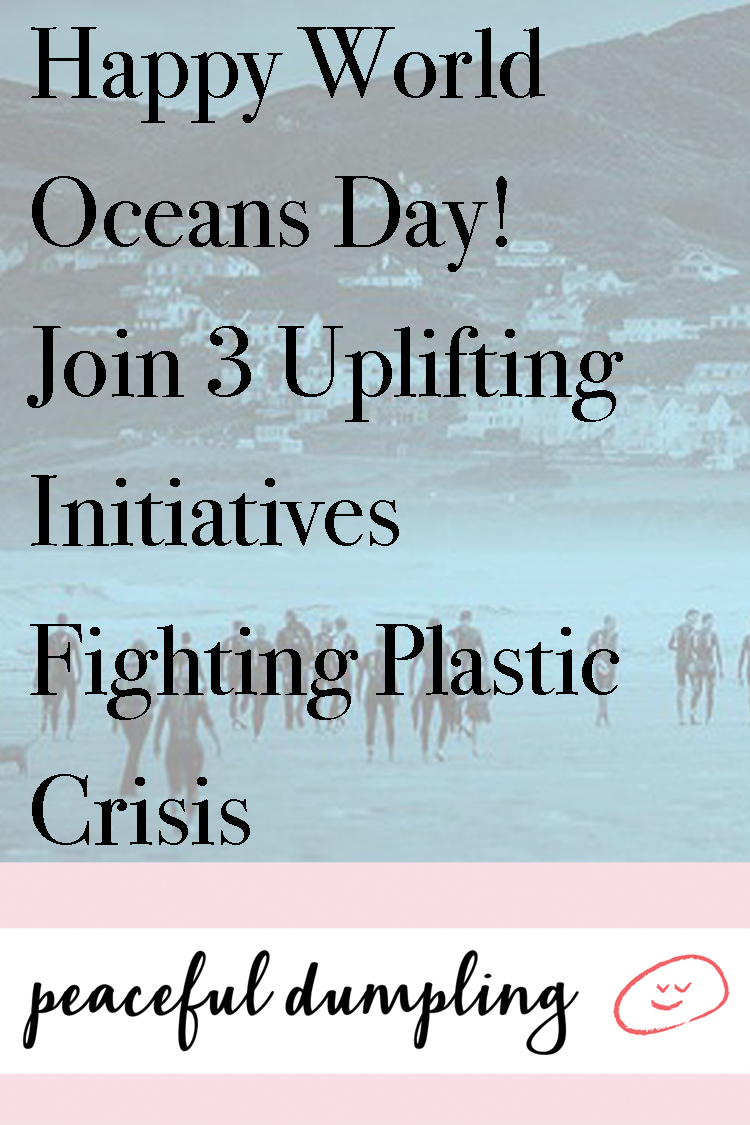It seems like just about every day of the year is allocated to a different cause for celebration or consideration. Some seem ridiculous, of course (National Ballpoint Pen day, anyone?). Today, however, is a big one; an important one. Today is World Oceans Day and the theme this year will be no surprise to you I’m sure: tackling the plastic plight.
I don’t presume for a moment that there’s a single Dumpling among us who isn’t aware of all the terrible ways that plastic is devastating the health of our seas and ultimately every living organism on this planet. It’s facilitating disease in coral reefs, it’s poisoning our oceans’ most majestic giants, and is even found in our tap water, with far-reaching consequences for our health.
We know that the clocks are ticking and there is much to be done; but drowning underneath all of the horrendous headlines are some marvelous developments that totally deserve to be shouted about from the rooftops (or, on the internet as we do things these days).
Today I’d like to hit you with a strong dose of positivity from the depths. Hopefully, this will inspire you to keep doing your bit. Keep turning down those single-use plastics. Keep bringing your reusable silverware and coffee cups out and about in your purse. Keep using your bamboo toothbrush. Keep using your menstrual cup. Because I tell ya, we’re saving the world, Dumplings! The more publicity plastic-free living gets and the more pressure is put on large corporations to respond with solutions, the quicker change will be implemented.
So, to kick things off:
Disaster Relief Recycling

Just like you already know all about the plastic problem we’ve got on our hands, you also are aware – I’m sure – of the widespread devastation that the past year’s hurricanes and earthquakes left both in the United States and further afield. In disaster zones, getting adequate supplies of our most basic needs such as clean food, water and shelter is absolute priority. This often means millions upon millions of plastic water bottles imported into the area by relief organizations which, of course, serve their purpose but then leave a mountain of waste behind afterward.
A brilliant research team at Rensselaer Polytechnic Institute in New York wanted to explore the possibility of recycling all of these wastewater bottles by transforming them into shelters for displaced persons. Combining architecture with engineering, students at RPI wanted to show that plastics don’t always have to be shredded and melted down to be rejuvenated and reused again. Using clever slide-lock designs and additional units, they can remain in their current state and be filled with dirt for reinforcement where needed.
Plastic-free Events

One of the most common ways that we use more plastic than we’d like to – even those of us very conscious about that which we consume – is at group events such as festivals and sporting competitions. Once you’re in there and in need of food or drink, you have little choice but to purchase what’s available, even if it comes sealed in plastic. In an ideal world we’d all be prepared for everything, but: life.
The real heroes in helping to tackle plastic waste are those organized events boldly going plastic-free. The Croyde Ocean Triathlon coming up next month is going to be the first plastic-free event in the UK. Decision-making like this has the power to influence the masses, so I’m hoping we see others follow suit as advertising beaches as ‘plastic-free’ now comes under the ‘luxury’ travel agenda. I mean come on, can you think of a single person who wouldn’t choose a pristine beach over one covered in pollution?
Plastic Free Groceries

Many of us trying to avoid single-use plastics find that we must do our grocery shopping in multiple places. There might be the farmer’s market for the fruit and veggies, then the bulk store for the dried goods and health food store for specialist items (especially the case for those following a vegan diet). What we’re doing is ultimately for the greater good, though it can take a lot of time and energy that most of us probably wish could be streamlined and focused on other things.
The Amsterdam branch of a Dutch supermarket, Ekoplaza, launched its first plastic-free aisle earlier this year, allowing customers the option to purchase 700 different items sans plastic. With plans to roll out the scheme nationally, the repercussions of this are huge and something I desperately hope will trigger other EU nations to follow suit with. Most people do their grocery shopping in a supermarket where it’s easy to get everything under one roof. If it can be made easier for these people to have the option to go plastic-free without having to make a special journey elsewhere, there is likely to be a huge shift in the amount of plastic consumed.
So you see, what we do does matter and can create change. Remember that you have purchasing power whenever you spend your money and so it is worth investing in those companies striving to save our seas. For more information on World Oceans Day and to locate an event happening near you, head here.

What are the latest developments in tackling plastic pollution where you live? Can you do anything to help our oceans?
Also by Kat: Coral Reefs Are Dying—How You Can Help Save The Nurseries Of The Ocean
Related: Microplastics Make Up 82% Of Plastic In Oceans. How You Can Make An Impact
These Genius Edible Packaging Ideas Are Giving Us Hope About The Plastic Crisis
Get more like this–sign up for our newsletter for exclusive inspirational content!
__
Photos via RPI, Croyde Ocean Triathlon, Peter Feghali on Unsplash
